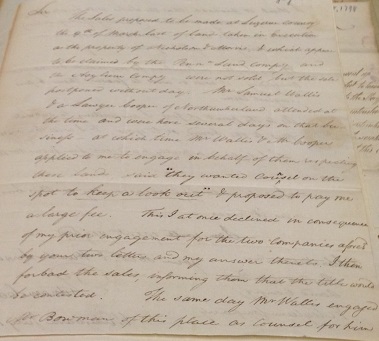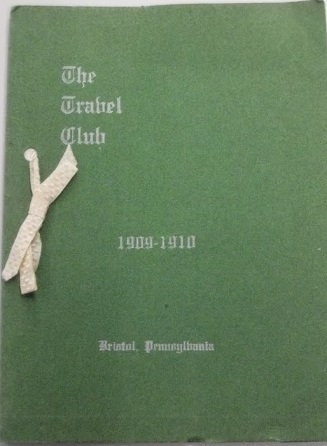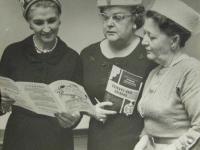Last fall HCI-PSAR facilitated a pilot internship program that paired emerging archivists in need of hands-on experience with small repositories in need of processing assistance and large repositories willing to train and supervise the intern. One of our interns, Sarah Leu, has just written a blog post about her experience! We matched Sarah with the Margaret R. Grundy Memorial Library and the Historical Society of Pennsylvania. Sarah reflected on Travel Club of Bristol (Pa.) records, a group of materials documenting a women’s club; the Asylum Company records, from a land speculation company in Pennsylvania in late 18th and early 19th centuries.
By Sarah Leu
This past fall I worked as an archives intern for the Hidden Collections Initiative for Pennsylvania Small Archival Repositories (HCI-PSAR). It was a great experience, and it’s not hard to understand why. I was exposed to both large repository and small repository environments, I was able to work with a variety of collections and produce multiple finding aids, and I met a lot of great people. For all of these reasons and more, this internship was not only fun, but also rewarding.
First, let me tell you about the basic set up of the internship, which is split into two parts. The first part involves training and hands on processing of a collection under the supervision of a professional archivist at a large repository. The second part is spent processing a collection from one of the small repositories that participated in HCI-PSAR with the professional archivist from the first part still available to guide you. Combining the experiences at both repositories, the intern is exposed to the differences (and some similarities) between a smaller repository and a larger one, while obtaining critical skills in processing collections.

Exterior of the Historical Society of Pennsylvania
During the first part, I spent time at the Historical Society of Pennsylvania (HSP), which fulfilled the role of large repository. I was assigned projects that would further my training in archival processing. What I loved about this portion of the internship is that my supervisors, Cary and Matthew, took the time to match the assigned projects with my needs and current experience. If I had not had any processing experience under my belt, I would have been giving beginner training with a fairly straightforward collection. However, knowing that I already had some experience arranging and housing collections, and that I did not have a lot of experience in researching collections, for which information might be vague and difficult to come by, my supervisors asked me to work with collections that were already housed, but did not yet have written finding aids in HSP’s online database.
The first collection contained papers from the Asylum Company, a land speculation company in Pennsylvania that existed in late 18th and early 19th century. Documentation was scarce and scattered. After determining what was in the collection and labeling the folders, I entered the inventory into Archivists’ Toolkit. The next step was to research and write the notes for the online finding aid. This part was challenging since intensive collection research was new to me, but I learned a lot about the process and various resources that are available for research. I also made mental notes about the order in which I should tackle the processing tasks and other tips so that my time is used more efficiently in the future.

Correspondence from the Asylum Company papers at HSP
As it turned out, the very next collection I worked on was related to the first collection, and I had to perform similar tasks. Everything I had learned by working on the Asylum Company papers was immediately clear to me because researching and writing the finding aid for the second collection was a much smoother and quicker process. I also got to work with a volunteer creating an inventory for and labeling a third collection with almost one hundred 19th century volumes. This could have been a daunting task, but working with a volunteer made it go by quickly and I got to know someone new in the process.
I liked being in a large repository because there was enough space to spread out the collections, if needed, extra or specialty materials were available, and the staff is professionally trained, so if I had a question about processing or a descriptive standard, it was easy to get an answer. HSP’s staff is very friendly, always happy to help you out, and interested to get to know you and the project you’re working on. Even though HSP is a large building with many departments, the people who work there make the environment welcoming and comfortable to new comers.

The Margaret R. Grundy Memorial Library
For the second part of my internship, I processed the Travel Club of Bristol (Pa.) records, a group of materials documenting a women’s club, housed at the Margaret R. Grundy Memorial Library in Bristol, Pennsylvania. About a year ago, in February 2013, HCI-PSAR wrote a blog post mentioning these records. I was excited to work with the collection because it spanned such a long time, from 1901-1995, and was rich in the quality of its documentation. The Travel Club records include the minutes of every meeting from 1901-1980; yearbooks as far back as 1908 detailing the club officers, members, and activities; and several scrapbooks.
While the collection was larger than others I had worked on before, I felt that I was ready to handle it based on my past experiences and the training I had already received during the internship. Plus, I maintained weekly contact with Matthew, my supervisor, just in case I ran into any issues or had questions. I also made sure to keep in mind or ask Gretchen, my contact at Grundy Library, about the preferences of the smaller repository as I processed the collection to ensure the staff there would be pleased with the outcome of my efforts.

An early yearbook from the Travel Club of Bristol (Pa.) records at Grundy Library
Part of this internship is to experience the environment of a smaller repository, and I couldn’t have been more pleased with the time I spent visiting Grundy Library. I was treated to a tour of the library and the museum, which is just next door, on my first visit and was able to help out with events at the library including the opening of an exhibition featuring materials from the archives and a genealogy workshop. These events were especially fun for me, as I had not yet experienced the public service, reference, or outreach side of archives. It reminded me how much I enjoy interacting with and helping people. I was also able to visit on Bristol Day, when the whole community is buzzing with activities and vendors in the streets. Seeing how a smaller repository was able to interact with other organizations in the local community to achieve a common goal was enlightening.
All in all, this internship was a very special experience. I learned a lot; each collection is different and presents its own challenges, writing a few concise paragraphs can sometimes be harder than writing a term paper, and people in the early 19th century loved using the word “sundry.” I gained invaluable experience in my desired line of work, but I also wound up meeting several wonderful people whom I feel have validated my decision to enter this profession. So if you get the opportunity to participate in HCI-PSAR’s archives internship, don’t pass it up, you won’t regret it. In fact, right at the end of my internship, there was an opening on HCI-PSAR's team, and they ended up hiring me!
View Sarah's finding aids for the Asylum Company papers, the Pennsylvania Population Company papers, and the Travel Club of Bristol (Pa.) records.
Our second HCI-PSAR intern, Tracy, also wrote a post about her experiences here.

